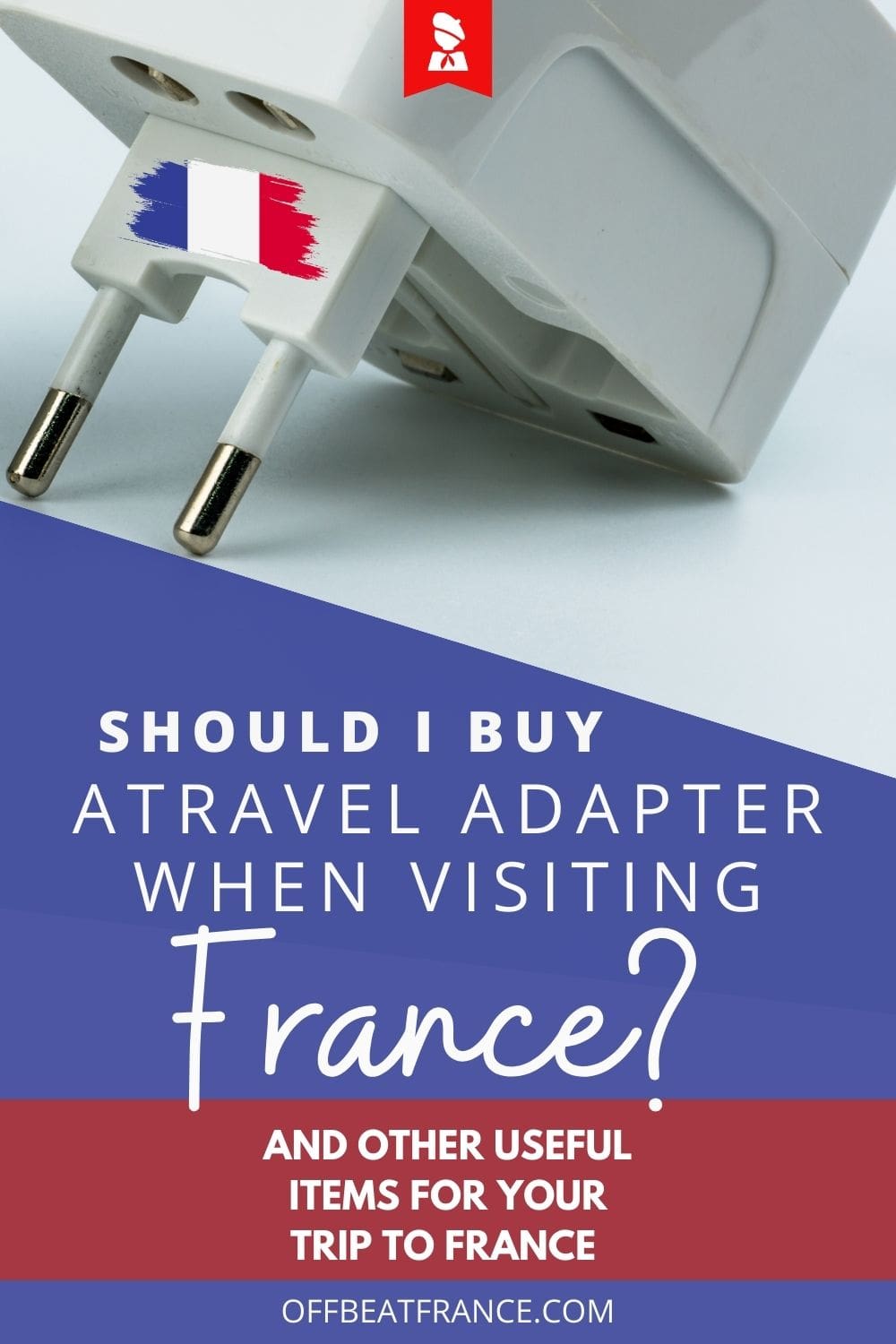Unsure about your French table manners? Click Here to download > > How to avoid these 10 food etiquette mistakes !
- Home ›
- Planning Your France Trip ›
- France Travel Adapter
Should I buy a Travel adapter for france?
Published 14 April 2023 by Leyla Alyanak — Parisian by birth, Lyonnaise by adoption, historian by passion
Not sure whether you need a plug adapter for France? Getting one is a good idea! When traveling abroad, I have bought small electrical goods, only to return to France and find out I should have bought an adapter before coming home...
If you’re traveling to France and plan to bring anything electrical with you, you’ll need an adapter plug for France – unless you already have one. This goes for all electrics, from phone chargers to laptops and hair dryers.
Whether you’re from the US, Canada, the UK, or most countries outside the European Union (and some former French colonies), you’ll need a French power adapter if you want to plug something into a socket.
Your USB charging cables, on the other hand, will work fine.
NOTE: Pages on this site may contain affiliate links, which support this site. See full Privacy Policy here.
NO TIME TO READ EVERYTHING?
Here are 3 best adapter plugs for French outlets if you're in a hurry!
➽ Epicka Universal travel adapter, for all countries
➽ Vintar European plug adapter with USB ports for European countries
➽ Lencent simple plug adapter for France only
Having the right plug is not something you want to forget, because it could mean the difference between enjoying your trip and wasting your time looking for an adapter in France, with only a slim chance of success.
Do you need a French plug adapter?
- What is an adapter?
- What is a converter?
- What kind of plugs does France use?
- What kind of power adapter do I need for France?
Can I buy a French plug adapter when I get to France?
- Can't I buy plug adapters in Paris?
- Can't I borrow a France power plug adapter from my hotel or Airbnb?
What is the difference between an adapter and a converter?
How can you tell if you need a French power converter?
Do you need a French plug adapter?
Do you have a smartphone and charger? Are you bringing a laptop to France? What about a curling iron or electric razor? If you plan to pack any of these, you'll need a French plug adaptor.
French power sockets are different from those in your country so your plug won't fit into them.
You may also need an additional travel voltage converter for France, because French standard voltage is higher than that of the US, Canada, Japan and a number of different countries in South America. Without one, your electrical device could blow up.
This post will tell you all about adapters and converters, the difference between the two, and which you need.
What is an adapter?
An electrical outlet adapter lets you insert an electric plug you use at home into the wall socket of another country.
The world uses 14 different types of electrical sockets, and only two of them – Types C and E – are compatible with French power outlets.
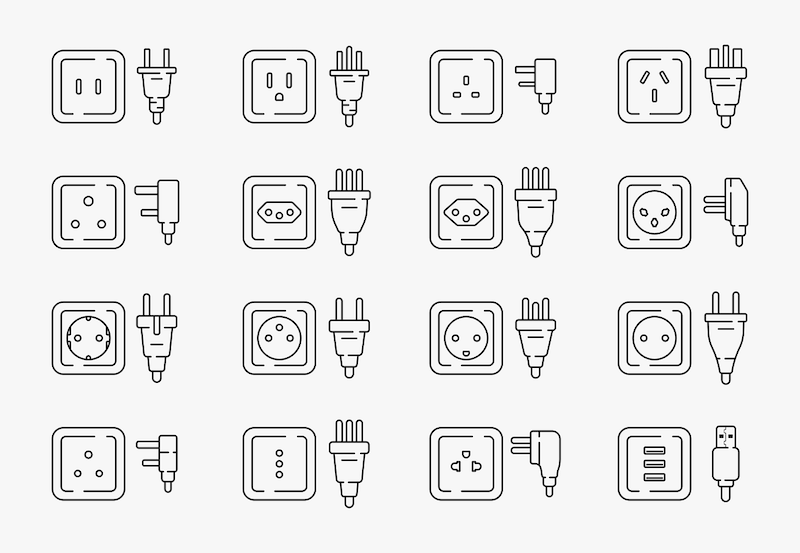 Just to give you an idea of the many different plugs you'll find around the world
Just to give you an idea of the many different plugs you'll find around the worldIn my many years of international travel, I've had the "pleasure" of dealing with most of them – hence this piece.
So yes, there's every chance you will need an adapter for France.
What is a converter?
A converter, on the other hand, is different. It deals with voltage, which is the electrical tension that runs through electrical wires. A converter simply converts your low voltage to the higher French one, and I'll explain in detail below. But first, let's get the adapters out of the way.
What kind of plugs does France use?
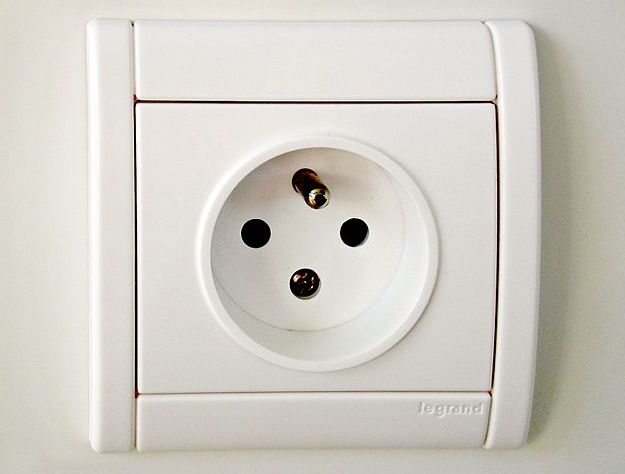
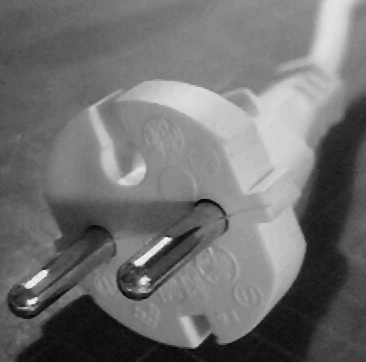
Electric plugs in France have round prongs and that is what they look like.
If your plug does NOT look something like this, you will need an adapter.
What kind of power adapter do I need for France?
A universal power plug adapter will do in most cases, or a specific one for France. Here are some of the tried and true options.
3 RECOMMENDED ADAPTOR PLUGS FOR FRANCE
➽ Epicka Universal travel adapter, for all countries
➽ Vintar European plug adapter with USB ports for Europe
➽ Lencent simple plug adapter for France only
Where do I get a France plug adapter?
At home, before you leave.
They’re not expensive and they are easy to carry so they won’t add weight to your luggage.
If you don’t get it ahead of time, you may have a hard time finding one once you get to France.
You’ll find plenty of adapters that can change French plugs to foreign ones, because French people buy them to travel. But it won't be easy to find the reverse (I speak from experience).
Can I buy a French plug adapter when I get to France?
Possibly, but not easily, because French shoppers need a different adapter than you do.
The adapters you'll find in France will mostly be for French travelers to the US or Canada, not the other way around.
Do yourself a favor and buy your power adapter for France before leaving home.
TIP: If you're also visiting Switzerland, Italy or other parts of Europe, it is probably cheaper to buy universal adapter rather than separate adapters for each country.
Can't I buy plug adapters in Paris?
You may be able to buy either a universal plug adapter or a travel adapter for France in one of the Relay shops, usually found in airports and train stations. But after a long trip and plane changes, do you really want to go chasing from shop to shop for an adapter?
You might also find one in electronic shops, like the FNAC, a popular department store (it sells books, music and electronic equipment), or a hardware store that sells electrical goods, like Leroy Merlin or BricoMarché.
Again, though, a word of warning – most adapters you’ll find are from French plugs to foreign ones, in other words, designed for French residents traveling abroad, not foreigners traveling to France.
It's just easier to buy your power plug for France outside France.
Can't I borrow a France power plug adapter from my hotel or Airbnb?
Maybe. If you’re staying in a large or upmarket hotel, there’s every chance (but no guarantee) that they’ll have adapters for all their guests.
Also, these days, especially in hotels that have been renovated, USB charging ports are becoming more common in the rooms. However, they’re not the norm by any means.
If you're unsure, email the hotel when you make your reservation and ask whether they provide a French adapter in the room, or at least whether they have one available they can reserve for your use. But even if they say Yes, there's no guarantee another guest won't sweet-talk the receptionist before your arrival.
I once reserved an adapter this way but when I arrived, I was told another client had needed one urgently so they had to give it to him. They apologized profusely, and I went on a lengthy adapter hunt.
BUY YOUR ADAPTOR PLUGS FOR FRANCE HERE
➽ Epicka Universal travel adapter, for all countries
➽ Vintar European plug adapter with USB ports for Europe
➽ Lencent simple plug adapter for France only
What is the difference between an adapter and a converter?
We're now wading into slightly more complicated waters, but it's important to understand the difference.
As we've seen, a France power adapter allows you to plug your electronic devices into French-shaped wall sockets.
A converter, on the other hand, actually converts the electricity from one voltage (yours) to another (that of France), allowing you to use your electrical appliances safely in France.
Electricity in North America is 110 volts, but in Europe, it's 220-240 volts.
If you plug your 110V appliance into a 220V (or 240V) socket, stand back! It may result in sparks or smoke, and there's every chance you'll kill the device – or even possibly start a fire. That's why you need a converter.
The most common devices, like laptops or chargers for your cell phones, have a built-in voltage converter for France and other countries. In other words, voltage is changed inside the device and you don’t need to intervene.
Some devices, including certain hair dryers, curling irons and similar implements, may have a dual voltage switch, meaning you can switch back and forth depending on where you are.
How can you tell if you need a French power converter?
If your electronics are dual voltage, you don't need a power converter.
How will you know?
Look for the small print somewhere on your device charger. You might need a magnifying glass to read this!
If you see something like the words "100-240V 50/60Hz", then your device is compatible with voltage in France. It means your item will work safely anywhere between 100 volts and 240 volts.
Without this mention, you'll probably need a converter. It's really not worth the risk to wing it with electricity.
Countries have different voltages – you can see the different voltages by country here or on the map below.
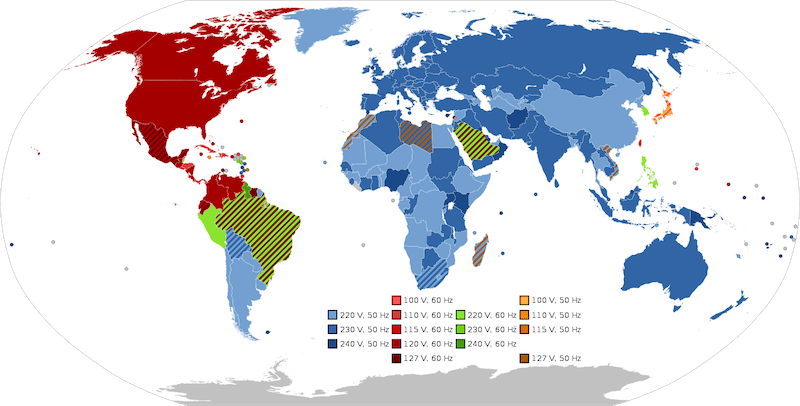 Power around the world by SomnusDe via Wikimedia Commons
Power around the world by SomnusDe via Wikimedia CommonsWhat to do if you need a converter?
- You can buy a French voltage converter, but if your device draws a hefty amount of power – like a hair dryer – this could be a heavy extra item to bring along.
- You can buy a replacement device that has a built-in dual voltage or a switch that allows you to go back and forth between voltages in your own country.
- You can check if the hotel has a converter plug in the bathroom – they often do – for small items like toothbrushes and razors only, not hair dryers (which many hotels provide).
- You can leave it at home. Forgo the curling iron, use a regular toothbrush, or use a battery-powered razor.
In all fairness, these days, most things you’d take with you for everyday use are compatible. You won't need a converter for your phone, laptop or tablet, for example.
If you do need one, however, today's models are getting smaller. But be careful and check whether they'll be able to handle your appliances. Some hair dryers may be too powerful for some converters.
To give you an idea, a hair dryer uses between 800w and 1500w on average, an electric toothbrush uses about 10w, a curling iron under 200w, and a razor 20w.
So a 500-watt converter is more than enough for small appliances but as you can see, you'll have to go far beyond that for a hair dryer (some of the larger ones are heavy and expensive). Rather than buy a converter, consider buying a new hair dryer when you get to France if your hotel doesn't offer one. Chances are it will be cheaper than the converter.
Adapter, converter, or both?
If you're from a country with different-shaped plugs, you'll need a power adaptor for France.
If your device isn't dual voltage, you may need a converter as well.
None of this will take much time to check, and doing this little bit of research may save you the frustration of not being able to use your electronics when you travel to France.
Other useful items for your trip to France
- Travel USB wall chargers – for all your USB needs
- Travel power strips – but you'll also need an adapter for the plug
- Plug adapter set – if you're traveling frequently and only want a small adapter
- Bluetooth travel speaker – so you won't miss good audio sound!
French adapter FAQ
What kind of adapter is needed for France?
What kind of adapter is needed for France?
A universal power adapter is the simplest option for France, because you can also use it in other countries, in Europe and beyond.
Are UK and France plugs the same?
Are UK and France plugs the same?
Not at all. French plugs are round, with two pins and sometimes (but not always) a hole for an earthing pin. UK plugs have three rectangular prongs. Rather than round, the plug shape is vaguely triangular.
Does France use the same or different plug types as the EU? Can I use an EU plug in France?
Does France use the same or different plug types as the EU? Can I use an EU plug in France?
No. Europe hasn't managed to standardize its plugs yet.
French plugs are round with two prongs, and usually Type C or E, which you can use in several European countries. Malta and Ireland (and the UK, no longer in the European Union) use a Type G plug, with three rectangular prongs. Denmark has different-shaped plugs (Type K) but you can use the European Type C plug. And finally, Switzerland and Liechtenstein use a Type J plug, two or three round prongs in a diamond-shaped socket.
What is a French plug size?
What is a French plug size?
France uses two types of plug: C and E.
Before you go...
Having the right adapter is important, but so are the many moving parts of planning your trip to France. If you're still in the planning stages, you might find this guide useful – it will help you plan your own itinerary for France.
Essential France travel resources
BOOK YOUR ACCOMMODATIONS
I use booking.com: for their huge inventory and for their easy cancellation policies
FLIGHT DELAYED OR CANCELED?
AirHelp can get you compensation (it works, I've used it)
DO YOU NEED A SIM CARD FOR FRANCE?
Here's the one I use when I travel abroad
PROTECT YOUR BELONGINGS
Keep pickpockets away with an anti-theft purse or an infinity scarf - and your identity with a VPN (I'm using Nord VPN)
TRAVEL INSURANCE
I recommend Visitors' Coverage or SafetyWing. for health away from home
GETTING FROM A TO B
I use Discovercars to rent cars and either Omio or RailEurope for train tickets
TO READ ABOUT FRANCE
Here's my long list of books about France
AND DON'T FORGET YOUR GUIDEBOOKS!
➽ Lonely Planet's Best Road Trips France
➽ DK Witness Road Trips France
➽ Any of the Green Guides series
➽ And, while you're at it, why not a map of France?
Did you enjoy this article? I'd love if you shared it!
